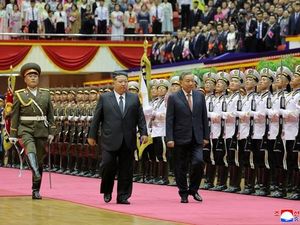The sporting world is once again abuzz with controversy and decisive action as the International Bobsled and Skeleton Federation (IBSF) has officially barred Russian athletes from competing at the 2026 Milan-Cortina Winter Olympics. The decision, made on September 12, 2025, at the federation’s congress in Cortina d’Ampezzo, Italy—the very site where the Olympic sliding events will be held—marks a significant continuation of the international community’s response to Russia’s invasion of Ukraine in 2022.
For months, speculation swirled about whether Russian athletes might be allowed to participate under a neutral flag, as has been the case in some other Olympic sports. But on Friday, the IBSF put the matter to rest. In a secret ballot, the federation voted down a proposal that would have permitted Russian bobsled and skeleton competitors to enter the Games as individuals with neutral status. The outcome was clear: Russian athletes will not line up at the start in Milan-Cortina.
This move comes hot on the heels of a similar ban imposed by the International Luge Federation back in June 2025. Both decisions underscore the ongoing repercussions of Russia’s actions in Ukraine and the broader debate over the role of politics in sport. Since the invasion, Russian athletes have been sidelined from major international events, including World Cup races and world championships, leaving the country’s sliding sports teams out in the cold for more than three years.
“Following extensive discussions, the Congress decided by secret ballot not to allow the participation of Russian athletes as neutral athletes in IBSF events,” the federation stated in its official communication. Russian officials, for their part, acknowledged that the vote was not unanimous, but the result was decisive enough to maintain the status quo.
The context of this decision is impossible to ignore. At the 2022 Beijing Winter Olympics, Russian sliders—10 in luge, six in skeleton, and 12 in bobsled—competed under the Russian Olympic Committee flag rather than the actual Russian flag. This arrangement was itself a product of ongoing sanctions stemming from the state-sponsored doping scandal that overshadowed the 2014 Sochi Olympics. The Beijing Games closed just four days before Russia launched its attack on Ukraine, setting off a chain of events that continues to reverberate through the world of sports.
With the Milan-Cortina Olympics set to open on February 6, 2026, and the World Cup season kicking off at the Cortina track on November 21, 2025, time is running out for Russia to mount any successful appeal. While it remains possible that Russian officials could challenge the decision, the logistical and competitive hurdles are significant. After years away from the international circuit, it’s unclear whether any Russian sleds would even be in contention for Olympic qualification.
U.S. bobsledder Kaillie Humphries, a prominent voice in the sport, weighed in on the decision. “I can’t speak for every athlete, but I can speak for myself and I don’t think it’s a surprise,” Humphries said Friday. “Even if they were allowed in, how would it work? Is it fair to Ukraine, to Ukrainian athletes, to other athletes that might have family or connections there? It would just create a whole storm of issues.” Humphries’ comments reflect the complex web of ethical, logistical, and emotional considerations that have shaped the debate.
Elsewhere in the Olympic movement, the approach to Russian participation has varied. At the 2024 Paris Olympics, Russian and Belarusian athletes were excluded from team sports, but some were allowed to apply for neutral status in individual competitions. The International Olympic Committee (IOC) set strict eligibility criteria, including a lack of public support for the war and no ties to military or state security agencies. Ultimately, 32 Russian athletes accepted invitations to compete in Paris after passing these tests—a stark contrast to the blanket bans in sliding sports.
Track and field, meanwhile, has maintained one of the hardest lines against Russian participation. On the same day as the IBSF decision, Sebastian Coe, president of World Athletics, reiterated that Russian athletes will remain barred from the upcoming world championships and other major events until a peace settlement is reached in Ukraine. “No, nothing has changed,” Coe stated emphatically. “I hope to God that it does change—not just for athletics—because it’s an unsustainable situation.” According to Coe, the sport needs “a settled position” and “a peaceful agreement before we can move off that landscape.”
This stance sets World Athletics apart from many other Olympic sports, which have allowed Russians to compete as neutrals at recent world championships and the Paris Games. Russians have been largely absent from major international track meets for about a decade, a situation that began with the fallout from the 2014 Sochi doping scandal and continued with Russia’s exclusion after the 2022 invasion of Ukraine. At the 2020 Tokyo Olympics, World Athletics granted only 10 spots for Russians to compete as “Authorized Neutral Athletes,” including high jump gold medalist Maria Lasitskene, who has not appeared in a major international event since.
The broader impact of these bans is hard to overstate. For Russian athletes, the door to the world’s biggest sporting stages remains firmly shut in many disciplines. For the federations, the decisions reflect an ongoing struggle to balance the ideals of fair play and international unity with the realities of geopolitical conflict and public opinion. And for fans, the absence of some of the world’s top competitors is a reminder that sport, for all its escapist appeal, is never completely insulated from the world’s troubles.
As the clock ticks down to Milan-Cortina 2026, the question of Russian participation lingers in the air. Will there be a last-minute reversal or successful appeal? Or will the ban hold firm, setting a precedent for future Games and world championships? For now, the sliding sports community—and the wider Olympic family—can only watch and wait as the story unfolds.
With the World Cup season set to begin soon and Olympic preparations ramping up, the focus will inevitably shift to the athletes who are eligible to compete. But the shadow of exclusion and the ongoing war in Ukraine ensure that the conversation around Russian participation is far from over. The world will be watching as Milan-Cortina draws near, eager to see how the next chapter in this complex saga will be written.





